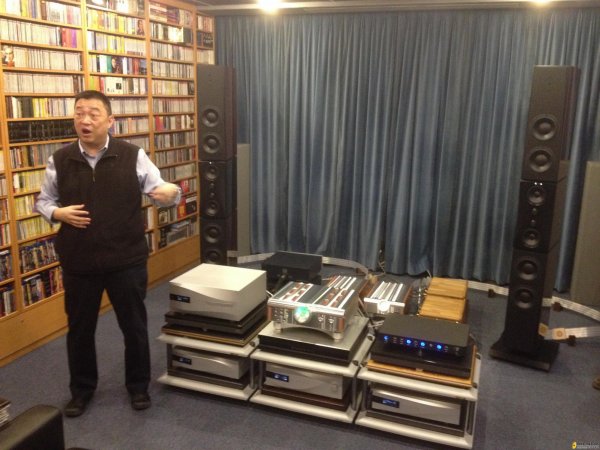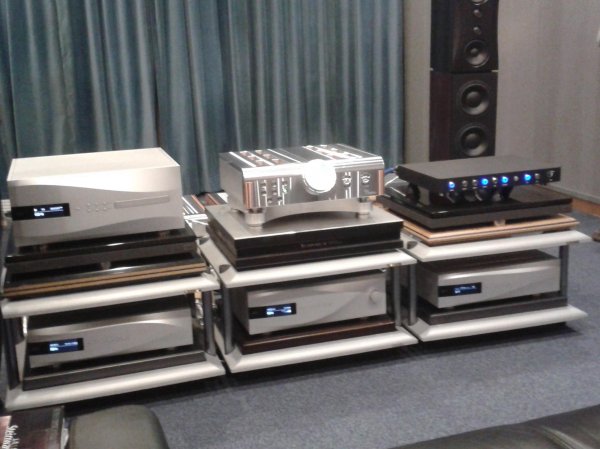microstrip
What else is new? We disagree.
Until you and the many you referred show us the beautiful systems, or I become tired of this hobby, we will surely disagree.
microstrip
What else is new? We disagree.
Until you and the many you referred show us the beautiful systems, or I become tired of this hobby, we will surely disagree.
Beautiful? I naively thought the important part was how they sounded, but I guess for the $50,000 DAC crowd that isn't the real point...
Hi
OK! I woke up a little early this morning and am reading this from Bob aka NStar?!
I find myself in total agreement with You Bob.. A first (could be a second, or third)
What does anyone expect from a product that cost $52,000? Instant Effusive praise with no listening sessions or experiences? if not scrutiny? moreover the designer of said product talk about the uniqueness of its products and hasn't yet made his case. What I have so far seen are standard practices in signal processing and/or similarity with existing products. So we want to be educated and understand the product. It all has been polite.
Now Audiocrack, you can't expect anyone including the brutally wealthy not to question a $52,000 investment based on and I am re-quoting you . We may want to know what did impress you to order a $52,000 DAC sight unseen! or in that case hearing unheard(I made up that expression). That is the purpose of a good board: To inquire , to ask questions, sometime tough but always polite. We are not an infomercial board. We are a discussion forum and we discuss, we ask questions, we learn and we enjoy music too and other stuff like cooking, kitchen appliances, cameras, cars, watches, sports and from time to time and grudgingly .... Politics
.
So stay around and prove your case. We are literally all ears.
I'm with Frantz. However you look at it - $52,000 price tag is exorbitant. Even more so, when you realise, that 50% of the procduct cost is often the box it is housed in. In other words - if you buy a $30k Vivaldi DAC, you pay 15k for the box and $15k for the electronics.
Trinity's box is nothing really special. It looks like a $3-4k product from the outside. So I think it is natural, when a '$4k looking' product sells for $52,000, to ask questions what makes it that special.
So far we didn't learn much from Dietmar, apart from the fact that it uses 16 BB DACs (PCM-1704: those are not 24/96 limited, as suggested in this thread, BTW) and it the arrangement is very similar to what Accuphase was doing in their 8 years old, and now discontinued DC-801 DAC.
If there are other things that make it really special - I would like to know. Maybe the price is not as unreasonable as it seems and the DAC is worth every penny. In which case, there could be at least a dosen of people on this forum interested in this DAC.


CKKeung - what was the source used with Trinity DAC ? Was that the Vivaldi transport ?
Yes, the comparison was done using the dCS Vivaldi SACD transport connected to the two DACs with Odin digital cables but a few files (PCM & DSD) were played by a PC notebook (connected with Crystal Absolute Dream USB cable).
Then the DAC was used in suboptimal conditions. One of the most important design features of this DAC, is an ultra stable clock it has on board. It is 1000 times more accurate than the dCS Vivaldi clock.
What you did by connecting the Trinity to the dCS transport, you slaved the DAC to the inferior Vivaldi clock (embeded in SPDIF signal), which was further jittered by the flawed SPDIF interface design.
The only way to take the full advantage of the superior clock that sits inside the DAC, is to use USB interface. USB input on the Trinity DAC is asynchronous, meaning that the source is slaved to the ultra stable Trinity clock, and not vice versa (as in the case of CD transport).
Trinity clock accuracy is 1ppb (past per billion) vs 1ppm (past per million) for the dCS clock.
Accuracy is not as important as clock stability, measured by phase noise (jitter). But jitter levels are also extremely low - Trinity quotes extreme low jitter levels at 28 femto seconds (10Hz?100kHz). dCS does not publish phase noise figures for their clock.
I'm not surprised you thought the Trinity was less detailed. That is how inferior clock and higher jitter manifest itself. With the USB input, with this kind of clock on board, the resolution of the DAC should increase many fold. The fact that it already sounded more natural and fluent than Vivaldi, is most promissing.
PS. From what I 've heard from Dietmar, they are just finishing their own CD transport design.
Then the DAC was used in suboptimal conditions. One of the most important design features of this DAC, is an ultra stable clock it has on board. It is 1000 times more accurate than the dCS Vivaldi clock.
What you did by connecting the Trinity to the dCS transport, you slaved the DAC to the inferior Vivaldi clock (embeded in SPDIF signal), which was further jittered by the flawed SPDIF interface design.
The only way to take the full advantage of the superior clock that sits inside the DAC, is to use USB interface. USB input on the Trinity DAC is asynchronous, meaning that the source is slaved to the ultra stable Trinity clock, and not vice versa (as in the case of CD transport).
Trinity clock accuracy is 1ppb (past per billion) vs 1ppm (past per million) for the dCS clock.
Accuracy is not as important as clock stability, measured by phase noise (jitter). But jitter levels are also extremely low - Trinity quotes extreme low jitter levels at 28 femto seconds (10Hz?100kHz). dCS does not publish phase noise figures for their clock.
I'm not surprised you thought the Trinity was less detailed. That is how inferior clock and higher jitter manifest itself. With the USB input, with this kind of clock on board, the resolution of the DAC should increase many fold. The fact that it already sounded more natural and fluent than Vivaldi, is most promissing.
PS. From what I 've heard from Dietmar, they are just finishing their own CD transport design.
(...) CAS with USB connection is still not the mainstream in Hong Kong. And for the average CAS audiophiles in Hong Kong, they will not buy such expensive DACs. Potential buyers of Vivaldi & Trinity are mainly SACD/CD audiophiles.
It's logical that the demo utilized mainly a traditional (but top quality transport with ext clock) transport. (...)
CK
Adam,
IMHO, you are over-stressing the importance of clocks. Accuracy is not important at all - any modern DAC is good enough in this aspect - and an isolated fantastic specification on the clock jitter means very little. Surely I would like to listen to the Trinity, as it is still the only way of judging top DACs!
Do you have experience comparing the different MSB clock modules?
I auditioned the Trinity dac at an open day of the Audio Technique Magazine listening room in Hong Kong this month.
Speaker was Dynaudio Platinum; pre- & power-amp were D'Agnostino, cables are mostly Nordost Odin; power-conditioning was by Shunyata flagship 2-boxes and Entraq ground-boxes.
Trinity was compared with the magazine's reference SACD system : dCS Vivaldi.
Just a short 1 hour session, both CD & high resolution files were used.
In summary, dCS was more neutral and with better resolution and soundstage/images.
Trinity was more musical and engaging.
However, when considering that dCS was a 3-piece system (dac+upsampler+clock) and needed so many expensive cables (Nordost Odin were used), Trinity was neat & tidy and with better C/P ratio.
The gentleman in the photo is Mr. Lincoln Cheng, Chief Editor of Audio Technique magazine of Hong Kong.
View attachment 12691
View attachment 12692
Not sure about your experience with clocks, but my experience tells me otherwise.
I have tested several clocks, including rubidium one, at the time I had my Scarlatti, and they all had a big influence on system performance. Especially in terms of resolution and lack of digital artefacts. Same with the clock link feature, which helped to overcome SPDIF limitations.
I have also tried all MSB clocks - the stock one, Femto 140 and Galaxy Femto. Each of those is worth every penny (and that means $10k in case of the Galaxy Femto clock !).
| Steve Williams Site Founder | Site Owner | Administrator | Ron Resnick Site Owner | Administrator | Julian (The Fixer) Website Build | Marketing Managersing |









